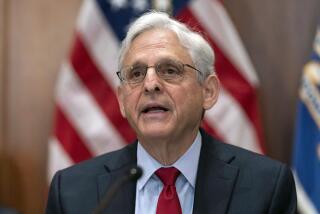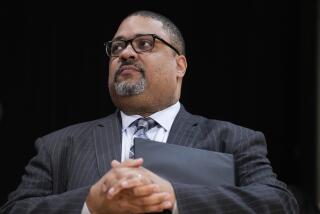Barr’s ‘Outsider’ Special Counsel in Bank Scandal Drawing Heat : Investigation: The attorney general was once a clerk for Wilkey. Critics say his subpoenas are too broad and he leans toward executive branch power.
- Share via
WASHINGTON — When Atty. Gen. William P. Barr, a critic of special-prosecutor provisions, reached outside the Justice Department for a special counsel to probe the House bank scandal, he cited “the unique circumstances and sensitivities” involved.
Department officials interpreted that to mean he was attempting to avoid any suggestion that partisan politics fueled the inquiry--a criticism raised when the investigation was first announced by U.S. Atty. Jay Stephens.
But Barr picked for the post Malcolm R. Wilkey, a retired federal appellate judge for whom he once served as law clerk.
The appointment has proved controversial on several fronts.
Wilkey aroused the ire of some House Democrats--who are likely to most feel the heat of the bank scandal--when he subpoenaed microfilm records showing every check processed by the bank for 39 months under investigation by the House Ethics Committee.
Opponents, including five House members, denounced the subpoena--which was ruled proper by a federal judge on Monday--as an overly broad fishing expedition designed to harpoon them in an election year.
Furthermore, critics of the selection of Wilkey, 73, contend he has a judicial track record of supporting the power of the executive branch over that of the legislative and judicial branches. They have argued that a broad-based subpoena infringes on the constitutional separation of powers among the three branches.
In one 20-year-old case that critics say demonstrates his executive branch leanings, Wilkey dissented from a U.S. Circuit Court of Appeals ruling that upheld the power of a special prosecutor to subpoena former President Richard M. Nixon’s Oval Office tapes. The Supreme Court later affirmed that power on an 8-0 vote; the tapes, and the prosecutor’s power to get them, were instrumental in the case against Nixon. Nixon eventually resigned because of a tape showing his complicity in the Watergate cover-up.
Referring to Wilkey’s blunt, forceful April 27 letter to House members explaining his reasons for subpoenaing most of the House bank’s records--including those of members who did not overdraw their accounts--a veteran federal prosecutor said: “He seems to be introducing political overtones--the kinds of things Barr feared in taking the case away from Stephens. He could have refined that subpoena more.”
In the letter to House members seeking “to correct some misapprehensions” about his probe, Wilkey said his preliminary inquiry has already “unearthed evidence that a classic check-kiting scheme may have occurred” at the now-closed House bank. “In our America the criminal law knows no specially privileged groups.”
But a Justice Department official rejected the suggestion put forth by some critics that Barr’s selection of Wilkey had backfired.
“Politics had nothing to do with Judge Wilkey’s selection and has had nothing to do with his work,” said Paul McNulty, a spokesman for both Barr and Wilkey. “The fact there is confrontation doesn’t mean this is a political battle.”
Any particular decisions Wilkey wrote as a judge on legislative and executive power “are clearly overshadowed by the universal view of his being a man of integrity, judgment and fairness,” McNulty added. “He has no agenda.”
Harold Koh, a Yale University law professor who is a sharp critic of executive power--and an acknowledged “liberal Democrat”--also defended Wilkey. Koh dismissed as “ridiculous” suggestions that Wilkey is a one-dimensional jurist whose affinity for a strong executive will influence his work as special counsel.
Koh, who served as a law clerk for Wilkey in 1980-81, offered as proof a 1984 case in which then-Judge Wilkey supported the rights of a cattle ranch owner in Honduras who was challenging the U.S. Army’s use of his land for training Salvadoran soldiers.
More to Read
Get the L.A. Times Politics newsletter
Deeply reported insights into legislation, politics and policy from Sacramento, Washington and beyond. In your inbox twice per week.
You may occasionally receive promotional content from the Los Angeles Times.










